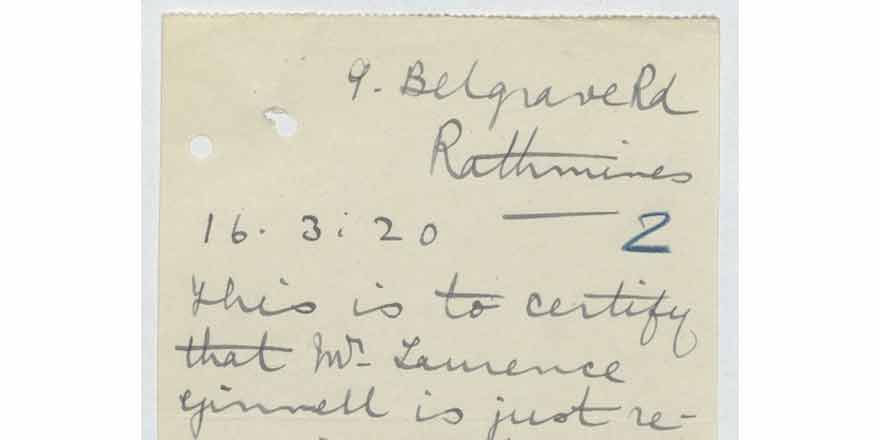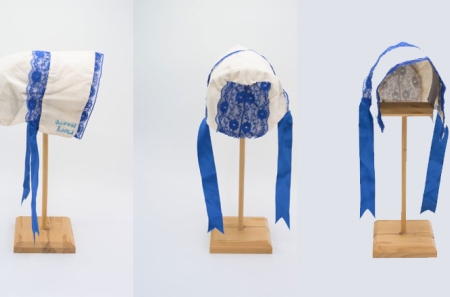
Newly-digitised Dáil Éireann records preserved in DRI
01 May 2020New collection of documents from the Irish revolutionary period (1918-1923) has been digitally preserved in the Digital Repository of Ireland.
The Digital Repository of Ireland team is pleased to share the news that a new collection of documents from the Irish revolutionary period (1918-1923) has been digitally preserved and is now available online in DRI. This follows a collaborative digitisation project between the Houses of the Oireachtas and the National Archives of Ireland, undertaken as part of the Dáil Éireann centenary commemoration in 2019.
The records comprise more than 1,100 records (66,000 individual pages) and are classified into two sub-collections known as DE/2 and DE/4 — the former being the records of the Dáil Éireann Secretariat and the latter being the session papers and proceedings of the First and Second Dáileanna*.
Ceann Comhairle, Seán Ó Fearghaíl, welcomed the initiative saying:
The publication of these records allows scholars and the public alike to peer inside the workings of Ireland’s fledgling parliamentary administration, to see and possibly better understand how our forebears strove to build a functioning democracy. I am very pleased that we have been able to bring these records into the public domain as part of our ongoing public engagement programme, particularly in these difficult times.
The Minister for Culture, Heritage and the Gaeltacht, Josepha Madigan, also welcomed the publication of the collection:
The launch of these records online, for the very first time, is a wonderful reminder in these centenary years of the dedication and hard work that went into making this the country we are so proud of today.
The Minister went on to pay tribute to the work of those involved in this project, in both the National Archives and Houses of the Oireachtas, and hailed this project as ‘a model for cross civil service co-operation’. Director of the National Archives, Orlaith McBride, said:
I am delighted that this collaborative effort between the Houses of the Oireachtas and the National Archives will allow the widest possible public access to these digitised archival sources that reveal so much about the early years of the formation of the Irish State and I wish to acknowledge the contribution of the Digital Repository of Ireland in hosting as part of its rich treasure trove of research material.
While the physical documents have been available to scholars for some time in the National Archives, this digitisation project brings them into the public domain via the DRI, where they are fully accessible to both academics and civil society. Gabriel Doherty, Lecturer in History at UCC and historical consultant to the Houses of the Oireachtas for the centenary commemorations had this to say about the significance of the records:
These unique records provide an almost complete picture of the civil aspect of a revolutionary struggle, but on a sufficiently small scale as to make it comprehensible and ‘human'. They represent the single biggest collection of documents relating to the civil side of the Irish independence struggle, thereby opening up the academic study of this aspect to the public in a manner similar to that which the Bureau of Military History and IRA Pension Application collections have done for the military side.
Speaking to the newly-published collection Director of DRI, Dr Natalie Harrower said:
As an open, trusted digital repository for Ireland’s social and cultural data, DRI is delighted to receive and steward this brilliant, foundational collection. The records find an apt home amongst other collections that document the years around the founding of the Irish state, including photographs of Dublin after the Easter Rising, the collections deposited through the Decade of Centenaries competition (Michael Healy collection, Dublin City Electoral Lists, The Capuchins and the Irish Revolution), and our own public history collections built through the Inspiring Ireland 1916 project. I am excited to see how researchers and curious browsers will discover, connect, and investigate this amazing new collection.
Further informative articles about the DE/2 and DE/4 collections can be found on the dail100 website. Visit the DRI repository to browse, view, and download the ‘Records of Dáil Éireann’ collection
[Image: this letter from Dr. Kathleen Lynn, dated 16 March 1920, certifies that Laurence Ginnell TD, director of propaganda, was 'recovering from a severe attack of neurasthenia'. https://doi.org/10.7486/DRI.6t05h207g]
*Note: The records of DE/2 are those of the Dáil Eireann Secretariat and formed part of the holdings of the State Paper Office, Dublin Castle to which they were transferred from the Library of Dáil Éireann in the 1960s. The files contain original and copy correspondence, primarily between Diarmuid Ó hÉigeartaigh, Secretary to Dáil Éireann, and members of the Dáil Éireann cabinet, as well as members of the Dáil. The 638 newly digitised files (over 22,000 pages) contain documents generated by the functioning of the administrative apparatus established in the aftermath of the 1918 general election to support the activities of the Dáil Éireann government.
The records of DE/4 relate to the proceedings of the First and Second Dáil including session papers (i.e. departmental and committee reports that were submitted in the course of the meetings). The 553 newly digitised files (over 24,000 pages) contain papers relating to peace negotiations and the Treaty; the Committee of Information on the Case of Ulster [CICU] and Belfast Boycott; and applications for employment.



